 This special issue of the Journal of European Public Policy edited by Helene Sjursen seeks to deepen the knowledge of the EU’s Common Foreign and Security Policy (CFSP). The collection critically examines the claim of an emerging democratic deficit in the field of foreign and security policy. In order to do so, it is necessary to have a clearer picture of the degree and form of integration in this domain. It is only when this is clarified that we can establish what kinds of democratic problems – if any – may have arisen. If the EU has moved beyond intergovernmentalism, questions would arise as to how national executives can be held accountable. However, a departure from intergovernmentalism does not necessarily point in a single direction, and different forms of integration would require different forms and channels of democratic legitimation. Hence, this collection follows a twin track of addressing both the questions of the ‘nature of the beast’ and of democracy.
This special issue of the Journal of European Public Policy edited by Helene Sjursen seeks to deepen the knowledge of the EU’s Common Foreign and Security Policy (CFSP). The collection critically examines the claim of an emerging democratic deficit in the field of foreign and security policy. In order to do so, it is necessary to have a clearer picture of the degree and form of integration in this domain. It is only when this is clarified that we can establish what kinds of democratic problems – if any – may have arisen. If the EU has moved beyond intergovernmentalism, questions would arise as to how national executives can be held accountable. However, a departure from intergovernmentalism does not necessarily point in a single direction, and different forms of integration would require different forms and channels of democratic legitimation. Hence, this collection follows a twin track of addressing both the questions of the ‘nature of the beast’ and of democracy.
The issue contains contributions by several RECON-affiliated scholars. Helene Sjursen establishes an analytical scheme that makes it possible to identify a putative move beyond intergovernmentalism and its democratic implications. Four constituent pillars of intergovernmentalism are identified and discussed: actors, decision-making procedures, scope of delegated powers and the raison d’être of the intergovernmental endeavour, which constitute necessary requirements for intergovernmentalism to be democratic. Sjursen finds that all four pillars are under pressure, thus suggesting that while European foreign and security policy has not become supranational, it is equally problematic to claim that it remains intergovernmental. Federica Bicchi analyses the EU foreign policy system as a community of practice, that is, a group of people who routinely get together on a common or similar enterprise with the aim of developing and sharing practical knowledge. The empirical focus of her analysis is the COREU network, which allows member states and EU institutions to exchange confidential information about foreign policy. Christopher Lord in his contribution develops normative arguments for the democratic and parliamentary control of the Common Security and Defence Policy. Erik Oddvar Eriksen, in turn, points to the rising demand of expert knowledge and argues that the objective of securing the sound specialized knowledge required for the EU's so-called comprehensive security strategy may not meet the requirement of being democratically accountable.
The special issue also contains articles by Ana E. Juncos and Karolina Pomorska, Jutta Joachim and Matthias Dembinski, and Ben Tonra.
Full info:
The EU's Common Foreign and Security Policy: The Quest for Democracy
Special Issue of Journal of European Public Policy, Vol. 18, No. 8, pp. 1069-1207, 2011
Helene Sjursen (ed.)